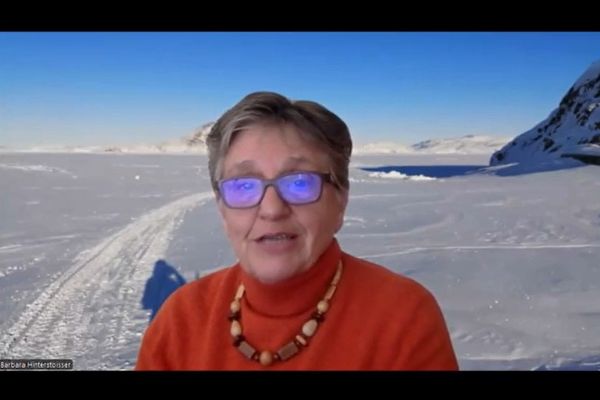The power of women’s networks in Disaster Risk Reduction

Ao.Univ.-Prof.i.R. Mag.rer.nat. Dr.rer.nat. Barbara Hinterstoisser reflects on her inspiring journey through science, leadership, and women’s networking, emphasising the vital role of female-led networks in advancing disaster risk reduction, education, and gender equality.
Ao.Univ.-Prof.i.R. Mag.rer.nat. Dr.rer.nat. Barbara Hinterstoisser was Vice-Rector of BOKU and is a long-time advocate for women’s equality. In her presentation from the we4DRR webinar in February 2025 , she shared personal experiences and emphasised the value of women’s networks. The following is a summary of her talk.
Building bridges: from chemistry to Disaster Risk Reduction
Barbara’s path is anything but linear. A chemist by training with a PhD in natural sciences, she worked as a teacher in chemistry and physics before joining the University of Natural Resources and Life Sciences (BOKU) in Vienna, where she focused on material science and process engineering. During her tenure, she took on various roles: project collaborator across Europe, chair of BOKU’s Working Group for Equal Opportunities, and later Vice-Rector for Teaching and International Affairs. Despite retiring in autumn 2024, Barbara remains an active member of the we4DRR network, a testament to her lifelong commitment to gender equality and collaboration.
Why women’s networks matter
Barbara’s presentation on her experience with women’s networks highlights their role in creating safe, empowering spaces. Whether in disaster contexts or male-dominated fields like alpinism and forestry, these networks provide:
- Emotional support
- Visibility and role modelling
- Cross-cultural collaboration
- Mentorship and skill exchange
She reflected on a childhood experience during the 1966 Schmittenbach disaster. What stood out wasn’t just the physical impact, but the strength of the women in her community - sharing, supporting, and stepping up behind the scenes. This early moment helped shape her appreciation for communal resilience and the invisible work women contribute during crises.
Women on the summit: alpinism and empowerment
Barbara participated in the first Austrian women’s alpinist expedition to Shisha Pangma in the Himalayas, a mission that symbolised more than just mountaineering. The climb represented a breakthrough in visibility for women in high-risk, male-dominated fields. The team, united by their skills and shared goals, served as a metaphor for disaster risk reduction work: building trust under pressure, managing scarce resources, and fostering international exchange.
Forestry and gender: a growing community
Forestry, traditionally a male preserve, became another field where Barbara helped build bridges. She joined the International Union of Forest Research Organizations (IUFRO) first women’s evening in 1995 and observed how women-only spaces led to richer, more honest conversations. Since then, gender equality in forestry has gained momentum through research, task forces, and leadership—culminating in IUFRO’s first female president in 2024, Daniela Kleinschmit. While student numbers and participation have grown, Barbara stresses that women’s networks remain essential to prevent regression and maintain visibility.
Championing equality at BOKU
Barbara's work at BOKU’s Equal Opportunities Working Party since 1996, including as chair from 2001 to 2007, established new formats like coaching, feminist salons, and interdisciplinary forums such as Female Professors in Dialogue. These initiatives strengthened professional ties, supported careers, and highlighted structural inequalities still needing attention. Though progress is visible in numbers, the gap between male and female professors persists.
we4DRR: a platform for progress
Barbara described we4DRR as more than a network - it is a mission-driven community. She advocated for expanding its definition to explicitly include education, noting it as a defence against misinformation and democratic erosion. The network offers more than connections: it nurtures collaboration between research, education, policy, and practice to face global challenges.
Advice & Reflections
During the Q&A, Barbara shared lessons for early-career professionals:
- Build confidence and trust your abilities
- Surround yourself with supportive networks
- Recognise the value of both emotional and professional connections
She noted how visibility and awareness of women’s networks have increased but warned against complacency.
Conclusion
Barbara’s journey illustrates that women’s networks are not relics of the past but living systems of support and transformation. Whether in disater risk reduction, science, or alpine summits, they help women navigate challenges, strengthen communities, and shape a more inclusive future. These networks must not only be sustained - they must be celebrated and expanded.